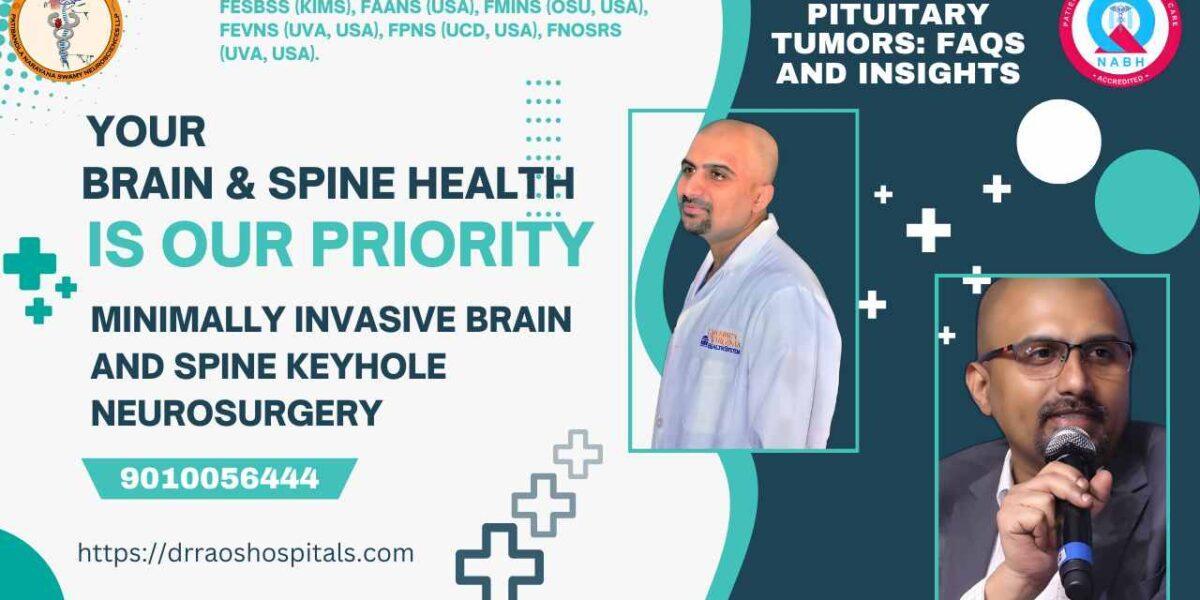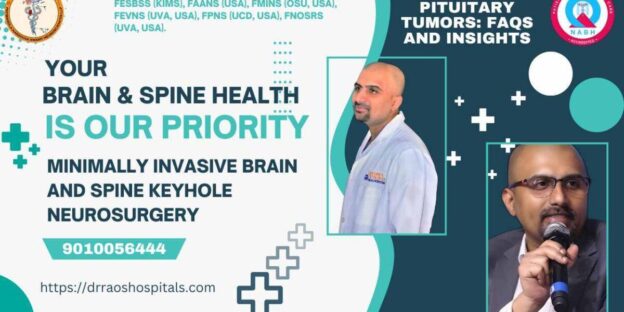50 FAQ neurology on Google answered by Dr Rao, the best neurosurgeon in India
Here are the answers to the first 50 common neurology-related questions asked on Google:
Who is a neurologist?
- A neurologist is a medical doctor specializing in diagnosing and treating disorders of the nervous system, including the brain, spinal cord, and peripheral nerves.
What is a neurological disorder?
- A neurological disorder is a medical condition that affects the nervous system, leading to various symptoms such as pain, weakness, seizures, or changes in cognition.
What causes migraines?
- Various factors, including genetics, hormonal changes, certain foods, stress, and environmental stimuli, often trigger migraines. The exact cause is still being studied.
How do I treat a headache?
- Treatment for a headache depends on its type. Over-the-counter pain relievers, relaxation techniques, staying hydrated, and identifying triggers can help manage headaches.
What are the symptoms of a stroke?
- Stroke symptoms include sudden numbness or weakness, trouble speaking, difficulty walking, severe headaches, and vision problems. Fast medical attention is crucial.
https://youtu.be/E9iuU-ER3KI
How do you prevent a stroke?
- Stroke prevention involves lifestyle changes like managing blood pressure, quitting smoking, controlling diabetes, and maintaining a healthy diet and weight.
What is epilepsy?
- Epilepsy is a neurological disorder characterized by recurrent seizures, which result from abnormal electrical activity in the brain.
Can epilepsy be cured?
- While epilepsy can often be managed with medication or other treatments, it is rarely completely cured. However, some individuals may become seizure-free.
What is Parkinson’s disease?
- Parkinson’s disease is a progressive neurological disorder that affects movement, causing symptoms like tremors, rigidity, and bradykinesia.
How to manage Parkinson’s symptoms?
- Managing Parkinson’s involves medication, physical therapy, and lifestyle modifications to improve mobility and quality of life.
What is Alzheimer’s disease?
- Alzheimer’s disease is a progressive brain disorder that impairs memory, thinking, and behavior. It is the most common cause of dementia.
How to care for someone with Alzheimer’s?
- Caring for someone with Alzheimer’s involves creating a safe environment, providing emotional support, and ensuring their medical needs are met.
What is multiple sclerosis?
- Multiple sclerosis is an autoimmune disease that affects the central nervous system, leading to a wide range of symptoms and disabilities.
What are the early signs of multiple sclerosis?
- Early signs may include fatigue, numbness, tingling, muscle weakness, and problems with coordination and balance.
What is a seizure?
- A seizure is a sudden, uncontrolled electrical disturbance in the brain that can result in various symptoms, from convulsions to brief staring spells.
How to help someone having a seizure?
- During a seizure, ensure the person’s safety by gently guiding them to the ground, protecting their head, and providing support until the seizure ends.
What is neuropathy?
- Neuropathy, or peripheral neuropathy, is a condition that affects the peripheral nerves, causing symptoms like tingling, numbness, and pain in the extremities.
What causes neuropathic pain?
- Neuropathic pain can result from nerve damage due to various factors, including diabetes, infections, injuries, or certain medical conditions.
What is the difference between ALS and MS?
- ALS (amyotrophic lateral sclerosis) primarily affects motor neurons and leads to muscle weakness. In contrast, MS (multiple sclerosis) is an autoimmune condition affecting the central nervous system and causing various neurological symptoms.
How is ALS diagnosed?
- ALS is diagnosed through a combination of clinical evaluation, neurological tests, and ruling out other conditions with similar symptoms.
What is a nerve conduction study?
- A nerve conduction study is a medical test used to evaluate the function of nerves and diagnose conditions like neuropathy or carpal tunnel syndrome.
How is a brain tumor diagnosed?
- Brain tumors are diagnosed through imaging studies like MRI or CT scans, along with a neurological evaluation and sometimes a biopsy.
What is the difference between a neurologist and a neurosurgeon?
- Neurologists specialize in diagnosing and treating neurological conditions using medication and non-surgical approaches, while neurosurgeons perform surgical interventions for neurologic issues.
What is the nervous system?
- The nervous system is the body’s control center, consisting of the central nervous system (brain and spinal cord) and peripheral nervous system (nerves).
How does the brain work?
- The brain functions through complex electrochemical processes, with different regions responsible for various functions like thinking, memory, and movement.
What is a neurodegenerative disease?
- Neurodegenerative diseases are conditions that progressively damage and kill nerve cells, leading to a decline in cognitive or motor function. Examples include Alzheimer’s, Parkinson’s, and Huntington’s diseases.
What is a cerebrovascular accident?
- A cerebrovascular accident, commonly known as a stroke, occurs when the blood supply to a part of the brain is interrupted or reduced, resulting in damage to brain tissue.
What is a lumbar puncture?
- A lumbar puncture (or spinal tap) is a medical procedure where a thin needle is inserted into the spinal canal to collect cerebrospinal fluid (CSF) for diagnostic purposes.
What is the treatment for restless legs syndrome?
- Treatment for restless legs syndrome may involve lifestyle changes, medications, and addressing underlying conditions contributing to symptoms.
What is the Glasgow Coma Scale?
- The Glasgow Coma Scale is a neurological assessment tool used to evaluate a patient’s level of consciousness after a head injury or other neurological event.
What is carpal tunnel syndrome?
- Carpal tunnel syndrome is characterized by numbness, tingling, and weakness in the hand due to compression of the median nerve in the wrist.
How is carpal tunnel treated?
- Treatment for carpal tunnel syndrome may include wrist splints, medications, physical therapy, or, in severe cases, surgery to relieve pressure on the median nerve.
What is a concussion?
- A blow to the head frequently results in a concussion, which is a mild traumatic brain injury. It results in temporary changes in brain function and can lead to various symptoms.
How long does it take to recover from a concussion?
- Concussion recovery varies by individual and the severity of the injury. Most people recover within a few days to weeks, but some may require more time.
What is Bell’s palsy?
- Bell’s palsy is characterized by sudden weakness or paralysis of facial muscles, typically on one side of the face. It is usually temporary and related to viral infections.
What are the symptoms of Guillain-Barre syndrome?
- Muscle weakness and paralysis are characteristics of Guillain-Barre syndrome. It often starts in the legs and can lead to difficulty moving or breathing.
What is vestibular neuritis?
- Vestibular neuritis is a condition that affects the inner ear, leading to vertigo, dizziness, and balance problems.
What is Chiari malformation?
- Chiari malformation is a structural defect in the base of the skull and cerebellum, which can lead to symptoms such as headaches, neck pain, and balance issues.
What is trigeminal neuralgia?
- Trigeminal neuralgia is characterized by severe facial pain in sudden, short bursts. Activities like eating or talking often trigger it.
What is myasthenia gravis?
- Myasthenia gravis is an autoimmune neuromuscular disease that causes muscle weakness and fatigue, often affecting the eye and facial muscles.
How to test for myasthenia gravis?
- Myasthenia gravis can be diagnosed through various tests, including blood tests, nerve conduction studies, electromyography, and the Tensilon test.
What is an aneurysm?
- An aneurysm is an abnormal bulge or ballooning in a blood vessel, which can be dangerous if it ruptures. It often occurs in arteries, including those in the brain.
What is the difference between a tension headache and a migraine?
- While migraines frequently include additional symptoms like nausea and light sensitivity, tension headaches typically only cause mild to moderate pain across the forehead or at the back of the head.
What is Huntington’s disease?
- Huntington’s disease is a hereditary neurodegenerative disorder that leads to motor dysfunction, cognitive decline, and psychiatric symptoms.
What is a TIA (transient ischemic attack)?
- A transient ischemic attack is often referred to as a “mini-stroke.” It results from a brief disruption in blood flow to the brain, which causes stroke-like symptoms that go away after 24 hours.
What is a lumbar herniated disc?
- A lumbar herniated disc occurs when the soft inner core of a spinal disc pushes through the more rigid outer layer, potentially leading to nerve compression and symptoms like back pain or leg pain.
How is a lumbar herniated disc treated?
- Treatment options for a lumbar herniated disc include rest, physical therapy, medications, and, in some cases, minimally invasive procedures or surgery.
What is a cervical herniated disc?
- A cervical herniated disc is a similar condition to a lumbar herniated disc but affects the neck region. It can result in symptoms such as neck pain, arm pain, or weakness.
How is a cervical herniated disc treated?
- Treatment for a cervical herniated disc may involve pain management, physical therapy, and, in severe cases, surgical interventions to alleviate nerve compression.
What is a lumbar radiculopathy?
- Lumbar radiculopathy, often known as sciatica, is a condition where spinal nerve roots in the lower back are irritated or compressed, causing pain, numbness, or weakness in the legs.
50 FAQ neurology on Google answered by Dr Rao, the best neurosurgeon in India; Dr Rao’s hospital, the best neurosurgery and spine surgery hospital in India


